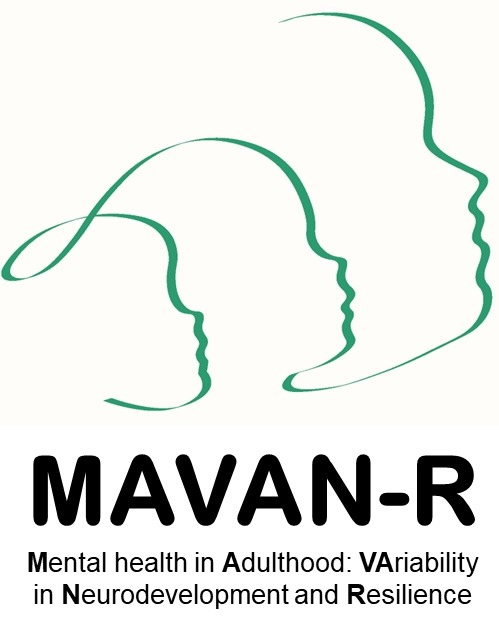
Mental health in Adulthood: VAriability in Neurodevelopment and Resilience (MAVAN-R) Study
The MAVAN-R Study explores how early life experiences, genetics, and environmental factors shape mental health in adulthood. Building on insights from the original MAVAN cohort, this groundbreaking research aims to uncover developmental pathways to resilience and vulnerability in mental health, paving the way for early interventions.
This page contains:
Latest NEWS
| 2025/03/25 | MAVAN-R adult assessment starting recruitment. See here. |
| 2024/09/09 | Youth focus group starting recruitment Click here! |
Origins
Tracing the roots and evolution of the MAVAN-R Study.
Areas of Assessment
What the MAVAN-R Study measures across participants.
Significance
Why MAVAN-R’s findings matter for mental health research.
Recruitment
Why Participate? MAVAN-R adult assessments start June 2025
Assessment Tools
The methods and instruments used to gather MAVAN-R data.

What is the MAVAN-R Study? (it history including the MAVAN study)
The MAVAN-R Study builds on the foundational work of the Maternal Adversity, Vulnerability, and Neurodevelopment (MAVAN) Study, which recruitment a community sample of 560 mother-child pairs from Montreal, Quebec and Hamilton, Ontario between 2003 and 2014 with the goal of understanding how prenatal and early life factors affect children’s socio-emotional and neurological development. The mothers were assessed during the pregnancy and the mother-child pairs assessed multiple time across childhood (3, 6, 12, 18, 24, 36, 48, 60, 72 months), during adolescence, and during the COVID pandemic. Key findings suggest that while most children exhibited normal development, high levels of maternal adversity during pregnancy were associated with poorer temperaments, more insecure attachments, more socio-emotional problems in childhood. However, 90% a positive self-evaluation of the abilities; 80% deemed themselves to be hopeful in being able to complete a difficult task; and 65% remained motivated to work on a difficult task even after failing. More importantly, both adverse and positive outcomes were more likely to be observed in genetically susceptible children. Articles outlining these and other findings can be found here.
Now, as participants reach adulthood, the MAVAN-R Study continues this exploration to assess how early exposures influence adult mental health. This longitudinal perspective is crucial for understanding long-term impacts and resilience.
Why is the MAVAN-R Study important?
The MAVAN-R Study holds the potential to revolutionize mental health research by identifying early predictors of conditions like anxiety and depression. By studying developmental pathways over time, MAVAN-R aims to provide insights that could lead to preventive strategies and interventions tailored to individuals’ unique experiences and genetic backgrounds. MAVAN-R focuses on multiple domains associated with negative and positive adult mental health. MAVAN-R combines measurement of positive and negative adult mental health with MAVAN findings from multiple domains during the mother’s pregnancy (depression, anxiety, socio-environmental adversity), child genetics, childhood and adolescence (cognitive function, socio-emotional functioning, mother-child interactions, attachment), and major life events to identify patterns linked to both vulnerability and resilience in mental health. These findings will inform policies and clinical practices, ultimately supporting mental well-being across generations.

What is being assessed during the MAVAN-R Study?
MAVAN-R focuses on multiple domains associated with negative and positive adult mental health. Our MAVAN-R. Our assessment protocol when the MAVAN-R participants are 22 years of age will examine the following domains: Psychopathology (e.g., depression, anxiety, aggression, substance abuse), Wellbeing (e.g., happiness, quality of life, thriving), and Cognition (e.g., memory, attention, attributions), Relational (e.g., relationships), and Personality (resilience, perfectionism, emotional regulation) factors. The assessment will involve two sets of online questionnaires completed six months apart, a virtual semi-structed interviews, and four online tasks. We will also obtain assessments of the young adults via questionnaires from their mother and partner/close friend. This comprehensive assessment approach allows the study to capture a holistic picture of factors influencing mental health trajectories. Click here to see why your continued participation is so important.


What tools are used to assess the MAVAN-R cohort?
The MAVAN-R Study employs a range of cutting-edge tools, including genetic testing, psychological assessments, and standardized questionnaires and tasks, to assess participants’ mental health and development. Advanced modeling techniques are used to analyze genetic-environment interactions and identify complex relationships across variables. These tools provide rich, high-quality data that drive meaningful insights into mental health outcomes. Moreover, the MAVAN/MAVAN-R studies are an integral part of the DREAM BIG consortium where data harmonization and replication are conducted to obtain robust findings that can lead to effective prevention/intervention practices.




